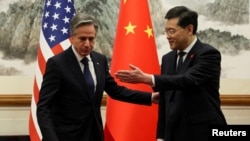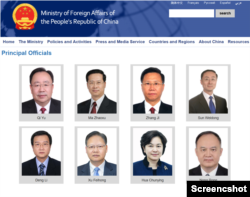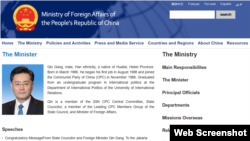Chinese Foreign Minister Qin Gang has not been seen in public for over three weeks, despite a flurry of high-profile Chinese diplomatic efforts to repair ties with the United States. His most recent public appearance was at a meeting with his Sri Lankan counterpart in Beijing on June 25.
Qin Gang’s absence has sparked a guessing game among media outlets and netizens.
On July 17, Newtalk, a Taiwanese media outlet, reported that Qin’s profile had been taken down from Chinese Ministry of Foreign Affairs’ website:
“Now the foreign minister's profile has been removed from the website of the Chinese Ministry of Foreign Affairs, making the outside world even more curious about Qin Gang's current situation.”
That is false.
The page Newtalk referred to lists the ministry's other principal officials, but not the foreign minister.
The website of the Ministry of Foreign Affairs of the People's Republic of China has a page devoted to the ministry’s principal officials, including vice ministers, and their recent activities. It has a separate page for the foreign minister, which lists all of his or her relevant activities.
Qin Gang’s profile is present on the ministry’s website in both Mandarin and English, along with his “speeches” and “activities.”
Qin Gang’s most recent speech, delivered on June 22, was a congratulatory message to the Jakarta Forum on ASEAN-China relations. Among his activities, the most recent one listed took place on June 25, when he met with Sri Lankan Foreign Ministry Ali Sabry and Vietnamese Foreign Minister Bui Thanh Son.
Qin Gang, 57, is one of Chinese President Xi Jinping’s most trusted high-ranking officials. He served as ambassador to the United States until December 2022, when Xi promoted him to the post of foreign minister. He was an active Twitter user before becoming foreign minister.
The disappearance of such an important figure, at a time when China and the U.S. are working to ease bilateral relations, is unusual. Experts note that this is the first time a senior Chinese government minister has been out of the public eye for more than 20 days without explanation.
On July 11, Chinese Foreign Ministry spokesperson Wang Wenbin announced, without elaboration, that Qin would not be attending the ASEAN Foreign Ministers’ Meeting due to “health reasons.”
When asked on July 17 about Qin Gang’s whereabouts, Chinese Foreign Ministry spokesperson Mao Ning said: “I don’t have any information to offer on this question.”
Asked whether Qin is still China’s foreign minister, Mao responded: “I suggest you check the website of the Ministry of Foreign Affairs.”
The official transcript of the Chinese Foreign Ministry’s July 17 press conference did not include any questions about Qin Gang. Topics that the Chinese government views as sensitive are typically excluded from these transcripts.
On July 19, Chinese Ambassador to the U.S. Xie Feng was asked whether Qin had met with former U.S. Secretary of State Henry Kissinger during his surprise visit to China.
Xie responded: “Let’s wait and see.”
Sari Arho Havren, an associate fellow at Royal United Services Institute in London, told the South China Morning Post that Qin’s case was “a telling example of how the system operates.”
“This is a guessing game. The Communist Party is far from being transparent and typically does not release information in this kind of situation, and although he has been missing for three weeks, which is a long time, we can only speculate,” she said.
It is worth noting that discussions about Qin Gang’s whereabouts have not been strictly censored on popular Chinese social media sites such as Weibo and WeChat.
For example, some comments hinting at the unsubstantiated rumor that Qin Gang had an affair with a journalist were not censored.
The personal lives and health of senior Chinese Communist Party officials are routinely kept secret. A high-profile official’s abrupt disappearance could be a sign they are in trouble, or the official could simply resurface without explanation.
Chinese President Xi Jinping himself vanished for two weeks in 2012 before he reappeared and became the country’s highest leader.
In 2018, Meng Hongwei, who was then the first Chinese head of Interpol, the international police organization, went missing during a trip back to China. After a prolonged absence, a Chinese court sentenced him to thirteen and a half years in prison for bribery.








